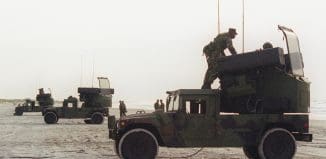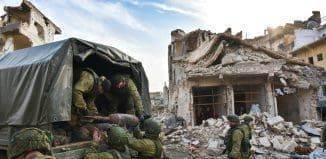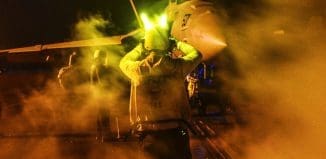The Syrian Chemical Weapons Crisis: Diplomatic Solutions
This post is also available in:  עברית (Hebrew)
עברית (Hebrew)
By Shlomo Brom and David Fridman
 The remarks by Secretary of State John Kerry, spoken at a London press conference on September 9th, 2013, according to which he said that the Syrian government could prevent the planned American attack if they will were to place their inventory of chemical weapons under international supervision, prompted a significant political move. The idea was adopted almost immediately by Russia, which was not satisfied with the proposal and expanded it into a program for the destruction of all chemical weapons in Syria. According to the Russian proposal Syria will also join the Chemical Weapons Convention (CWC), and Russia urged Syria to accept. Syria announced shortly thereafter, through its foreign minister Walid Muallem, who met with Russian Foreign Minister Lavrov in Moscow, that it accepted the plan. In response President Obama announced that the offer should be seriously considered and he would, for the time being, suspend all plans of an attack.
The remarks by Secretary of State John Kerry, spoken at a London press conference on September 9th, 2013, according to which he said that the Syrian government could prevent the planned American attack if they will were to place their inventory of chemical weapons under international supervision, prompted a significant political move. The idea was adopted almost immediately by Russia, which was not satisfied with the proposal and expanded it into a program for the destruction of all chemical weapons in Syria. According to the Russian proposal Syria will also join the Chemical Weapons Convention (CWC), and Russia urged Syria to accept. Syria announced shortly thereafter, through its foreign minister Walid Muallem, who met with Russian Foreign Minister Lavrov in Moscow, that it accepted the plan. In response President Obama announced that the offer should be seriously considered and he would, for the time being, suspend all plans of an attack.
There are two ways to look at this development. The first, which is the way the Israeli media looks at the matter, is to assume that this is a Russian-Syrian trick meant to buy time, assuming that the longer an American attack is delayed, the less probable it actually becomes. This way of thinking is problematic, since if the U.S. and the international community were to find out, the American Congress would most likely support Obama’s attack plans. There’s no good basis for the assumption that such a deception will actually lower the chances of an American attack.
The second observation is based on the assumption that this is a serious proposal, stemming from an understanding by Russia and Syria that without it the chances that the U.S. will attack are high, and such an attack may have far reaching implications. Seemingly there was no reason for both of these players to be so concerned about an American attack, especially after the president and secretary of state made great efforts to emphasize the limited scope of the planned penal action. The key to understanding the Syrian and Russian vision apparently their conspiratorial view of American policy. They are convinced that the main objective of the United States is regime change in Syria, as was the case with Iraq and later Libya. Russia made sure to emphasize at the beginning of the crisis in Syria that the United States will not be allowed to repeat its actions concerning Lybia, in which the limited resolution of the Security Council gave the West legitimacy to conduct an extensive operation to overthrow the Qaddafi regime. Russia also backed the declarations with actions and successfully prevented all relevant Security Council resolutions using its veto powers.
The deadly chemical strike in the Damascus suburbs undermined all these efforts by Russia, because it has created a situation where there is considerable legitimacy to an American action even without a Security Council resolution – an action which, according to both countries, is only the first step in a major military overthrow of the regime. The two countries had an interest, therefore, to pay a high price in order to prevent such an American action. Moreover, for Bashar al Assad chemical weapons have become a liability in terms of their effect on the survival of the regime, even though it means that he is giving up a strategic deterrence asset against Israel. From Russia’s perspective this is an opportunity to become a major player again, one that everyone should take into account.
If this hypothesis is correct this is a significant victory for President Obama. His threat of attack was very effective and achieved more than its stated goal. He wanted to deter Syria from further use of chemical weapons, thereby cementing the fact that the use of chemical weapons is illegitimate. In practice Obama will also disarm Syria, thereby also cementing the fact that merely having chemical weapons is illegitimate. Beyond that, in light of the civil war in Syria, this means that the dangers of the huge chemical arsenal in Syria, which different scenarios may fall into the even less responsible hands than Assad’s brutal regime, can be neutralized. That will be a great relief for Israel. It will also have far reaching implications on Iran and its nuclear program, because it will strengthen the belief that Iran needs to be similarly pressured in order to achieve similar results. If, however, it turns out to be a trick, Obama’s resolve will be tested again. An attack, in that case, will help maintain his credibility and avoid further use of chemical weapons. Failing to attack will hurt his credibility and erode America’s ability to influence the actors in the Middle East, including Iran.
iHLS – Israel Homeland Security
There are considerable difficulties in obtaining the consent of all parties involved on the principles and terms of the planned oversight and destruction of the Syrian chemical array. In addition, there are also difficulties in the actual execution of the program after an agreement is reached. First, the West must ensure that the Syrians (and their supporters – mainly Russia) are really negotiating and not just trying to stall. At first glance it seems that Russia, as the country which has raised the solution and probably pressured Syria to agree to it, will continue to support the plan and try to bring it to fruition, since it may result in political and strategic gains. As to the difficulties in carrying out the actual program, lessons can be learned from the situation in Iraq in the 90s, after the first Gulf War. In accordance with U.N. resolutions, specialist delegations in Iraq attempted to expose, monitor and destroy Saddam Hussein’s chemical and biological weapons. The Iraqi ruler and his people made every effort to interfere with the work of the inspectors or even to prevent it, eventually suspending operations for several years. Conditions in Syria today are much more complex and problematic than they were in Iraq. Battles take place in Syria between Assad’s forces and different groups of rebels, and it seems that it would be very difficult to implement the oversight and the destruction of the chemical array under these conditions. Moreover, there is a considerable risk of leakage of chemicals and/or weapon systems to extremist terrorist organizations. In addition, it is known that the Syrian chemical-biological array before the war included many components and sites: research institutes, production sites, storage sites and, of course, the various weapon systems. Many of these sites were well known to the West. During the ongoing war in Syria were the entire array shifted, and now it is not certain that all sites are accounted for. In this situation, and in order to implement the control and destruction program effectively, the cooperation of the current Syrian government will be required.
In techno-operational terms there are at least two main alternatives for handling the Syrian chemical array. The first alternative – most of the chemical arsenal can be transferred to a third country, such as Russia, which has tremendous experience in the treatment and destruction of chemical weapons. Much of Assad’s chemical arsenal is stored in “binary” form, two different materials that need to be mixed in order to become weaponized. Base materials are not highly toxic, and their transfer or destruction are relatively safe affairs. However, some weapon systems that have been made ready for use will need to be taken care of on Syrian soil, and development, production and storage sides will have to be destroyed.
The second alternative is basically similar to the program carried out in Iraq after the first Gulf War by the U.N. missions. Observers from the OPCW (Organization for the Prevention of Chemical Weapons) will help map, monitor and supervise all relevant sites, initially using existing intel and with the cooperation of the Syrians. In the second phase it will be necessary to lay out a program for the destruction of the chemical array on Syrian soil. Again there are several options that are not simple in terms of techno-logistics and safety, because they will most likely have to be in accordance with the very stringent OPCW regulations. During the Iraqi affair in the 90s OPCW has not been established yet and the stringent safety regulations were not yet in place. The first alternative seems preferable, since it can circumvent some of the difficulties described above and the full neutralization of the chemical arsenal will be quicker.
In conclusion, it can be said that although there are considerable difficulties in terms of the principles, terms and execution of the agreement, this is a golden opportunity to eliminate one of the largest and most dangerous chemical weapon caches in the world, a huge risk to the entire region and to Israel in particular. At the same time the question of whether Israel should reconsider its policy on the ratification of the Chemical Weapons Convention (CWC), which it already joined, will come up.
INSS Insight, Issue 466, September 12th 2013






























